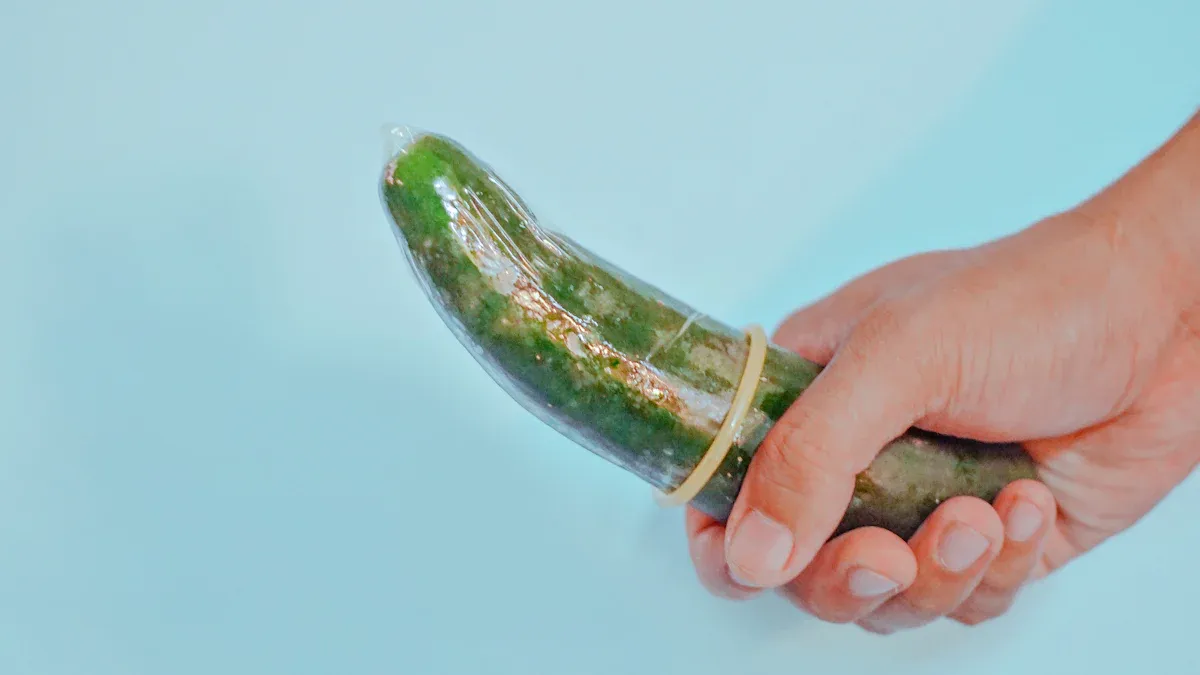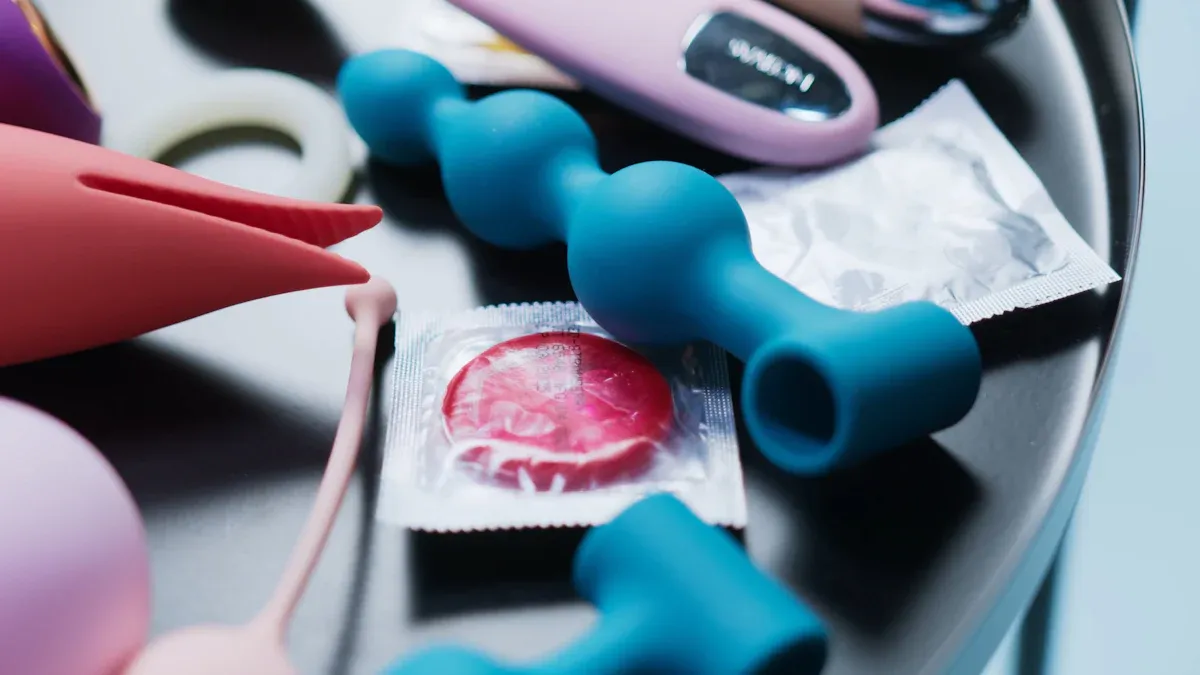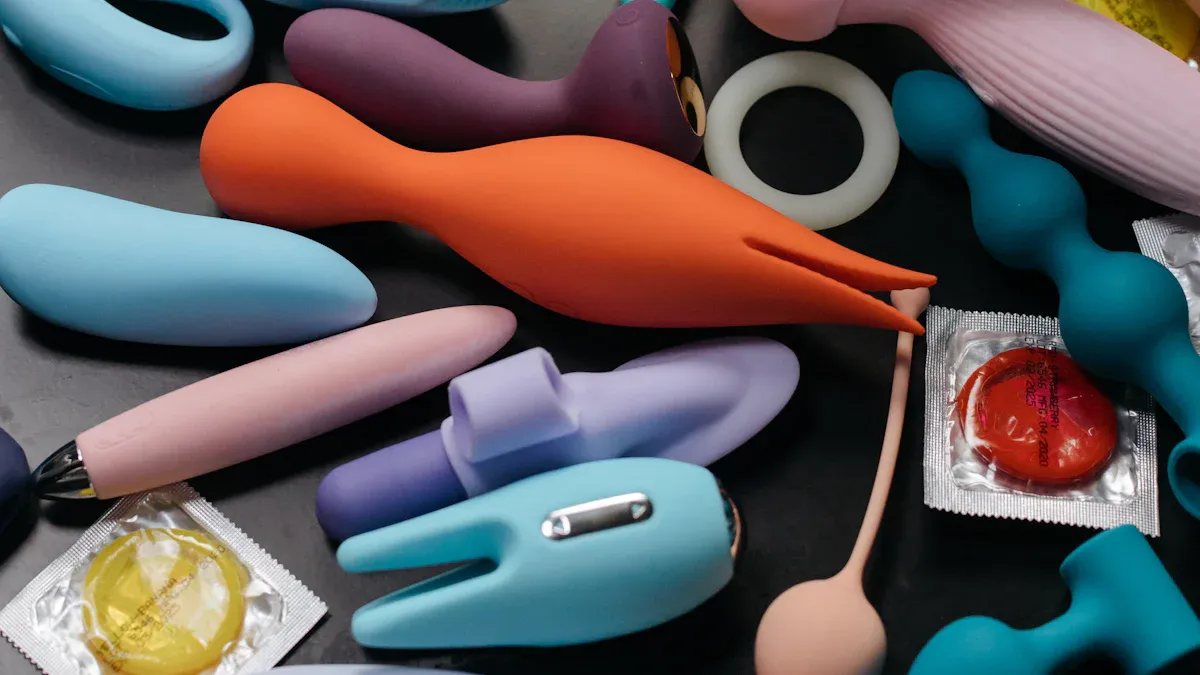What Makes PVC Dildos Unsafe

PVC dildos can be unsafe for your body. When you use pvc sex toys, you might touch chemicals like phthalates. Studies show these chemicals can cause health problems. Scientists say pvc dildos let out microplastics and bad chemicals when used. The danger is higher with Inflatable Dildos, Triple Dildos, or a Spiked Dildo made from PVC. PVC sex toys are not like safe sexual health products. They can hold bacteria and fall apart as time goes on. To stay healthy, pick safe sexual health products. Do not use dildos made from unsafe materials.
What Are PVC Dildos
Material Overview
When you look at pvc dildos, you see toys made from a plastic called polyvinyl chloride, or PVC. Manufacturers use this material for many pvc sex toys. To make the plastic soft and flexible, they add chemicals called plasticizers. Most often, these plasticizers are phthalates. Over 90% of phthalates go into softening PVC. These chemicals help give pvc sex toys their bendy feel and clear look. However, the base material always contains chlorine. This means that even if a pvc dildo says “phthalate-free,” it still has risks. The chlorine in PVC can create toxic byproducts. These byproducts can harm your body, even if you do not see or smell them.
Note: Many companies do not share what chemicals they use instead of phthalates. You cannot always know what is inside your pvc sex toys.
Why PVC Is Used
You might wonder why so many companies make pvc sex toys. The answer is simple: cost and variety. PVC and jelly rubber are cheap materials. This makes pvc dildos affordable for many people. You can find a pvc dildo in almost any shape or size. The soft texture feels gentle, which some users like. Manufacturers can mold pvc sex toys into many designs quickly and easily. They can also make large batches that all look the same.
Main reasons companies use PVC for dildos:
Low price makes them easy to buy.
Soft texture feels comfortable.
Easy to shape into many forms.
Fast and repeatable production.
Even though pvc sex toys are popular, safety is not the main reason companies choose this material. They pick PVC because it saves money and makes production simple. You should know that these benefits come with health risks. When you choose a dildo, think about what is safest for your body.
Health Risks of PVC

Chemical Exposure
Using pvc sex toys can put your body in contact with harmful chemicals. Many pvc dildos have phthalates, which make plastic soft. Phthalates can mess with your hormones and cause health problems over time. Some pvc sex toys also have heavy metals like lead or cadmium. These metals can build up in your body and cause serious health issues. Cheap pvc sex toys may also have other bad chemicals like trimethyltin chloride, toluene, or carbon disulfide. Even if a toy says “phthalate-free,” it might still have unsafe stuff inside.
Note: Labels on pvc sex toys are not always honest. Companies do not always tell you every chemical they use.
PVC can cause hormone problems, trouble having kids, and even hurt your nerves. These chemicals can come out of the dildo when you use it, especially if it gets warm. Over time, your body can take in these toxins, which makes you more likely to get sick. Safe sexual health products use materials like silicone, glass, or stainless steel. These do not let out harmful chemicals.
Porosity and Infection
Porosity is a big problem with pvc sex toys. Porous materials have tiny holes you cannot see. Bacteria, mold, and fungus can hide in these holes. When you wash a pvc dildo, you only clean the outside. The germs inside do not go away. This makes it hard to keep the toy clean. If you use a porous dildo inside your body, you can get infections. These infections can hurt, burn, or cause worse health problems.
Nonporous materials like silicone, glass, and metal do not have these holes. You can clean them much easier. They do not trap germs, so they are safer for your body. Using safe sexual health products made from nontoxic materials helps keep you healthy. Good hygiene is easier with nonporous toys.
Dildo Safety Concerns
You should look for signs that your pvc sex toys are getting old. If a dildo starts to break down, it might change color, crack, or feel sticky. You might smell strong plastic. These changes mean the toy is letting out more chemicals and getting more porous. A broken dildo can hold even more germs, so infections are more likely. You might get rashes, burning, or other skin problems.
Tip: Always check your toys for damage. Throw away any toy that looks or smells strange.
Cleaning and using condoms can help lower some risks, but they do not make pvc dildos totally safe. Oils in pvc sex toys can make latex condoms weaker. Even if you clean well, you cannot get all the germs out of a porous toy. If you have had an infection, throw away any pvc sex toys you used. Safe sexual health products made from non-toxic, nonporous materials are much better for your health and hygiene.
Regulatory Standard | What It Covers |
|---|---|
ISO 3533 | Sets safety rules for sex toys, including material safety for products that touch your body. |
ASTM F963 | Tests for harmful chemicals like phthalates and lead in toys. |
California Proposition 65 | Requires warnings if a product contains toxic chemicals. |
FDA (CFR Title 21) | Regulates medical sex toys and requires safe manufacturing and labeling. |
You should always pick safe sexual health products. Look for toys made from nontoxic, nonporous materials. Keeping things clean and checking your toys often helps keep you safe. Stay away from unsafe materials like pvc dildos to lower your health risks and protect yourself.
Myths About PVC Dildo Safety
“Phthalate-Free” Claims
Many dildos say they are “phthalate-free.” This label makes them seem safe. But this does not always mean the dildo is good for your body. Some companies take out phthalates and use other chemicals like DOTP. Scientists have checked vinyl dildos and did not find phthalates. But they did find these new chemicals. We do not know if these new chemicals are safe. You cannot be sure a phthalate-free pvc dildo is safe for you.
Companies often say their dildos are phthalate-free. There are no strict rules to check if this is true. Be careful if the company does not tell you what chemicals they use.
Phthalates like DEHP can cause hormone problems and cancer. Some countries limit phthalates in kids’ toys. Sex toys do not always follow these rules. Even if a dildo says “phthalate-free,” it might have other unsafe chemicals. The safest choice is to pick dildos made from silicone, glass, or stainless steel.
Hypoallergenic Labels
Some dildos have “hypoallergenic” on the label. This word makes you think the toy is safe for everyone. But it does not promise safety. PVC is a porous material. Tiny holes in the dildo can trap germs. Even after washing, germs can stay inside. This can cause infections, rashes, or other health problems.
Common myths about PVC dildo safety:
If a dildo is sold in stores, it must be safe.
Phthalate-free pvc dildos are always body-safe.
Using a condom makes any dildo safe.
Hypoallergenic means no risk of infection.
PVC dildos, even with hypoallergenic or phthalate-free labels, can still hurt your health. The safest choice is to use dildos made from non-porous, body-safe materials. Always look for clear facts about what your dildo is made from. Your safety depends on making smart choices.
Body Safe Sex Toys and Alternatives

Safer Materials
You have many safe alternatives to pvc sex toys. Health experts recommend body safe sex toys made from nonporous, nontoxic, and body-safe materials. These materials do not trap germs and are easy to clean. When you choose safe materials for sex toys, you protect your health and enjoy better hygiene. Here are some of the best options:
Medical-grade silicone: Non-toxic, non-allergenic, and easy to disinfect. It stays soft and does not break down.
Borosilicate glass: Smooth, nonporous, and safe for temperature play.
Stainless steel (nickel-free): Durable, body-safe, and easy to sterilize.
ABS plastic and Lucite: Nonporous and safe for most users.
Gold and silver: Safe for people without metal allergies.
Chlorine-free vinyl (EVA, PEVA): Safer than PVC, but still check for quality.
Materials like PVC, phthalates, and low-grade plastics can harm your body. Always look for body-safe sex toys made from medical-grade or non-toxic materials. Investing in safer sexual health products helps you avoid health risks.

How to Identify Safe Toys
You can spot safe sexual health products by checking the label and using your senses. Look for clear material listings, such as “medical-grade silicone” or “borosilicate glass.” Trusted brands share this information and offer care instructions. When you touch a dildo, it should feel smooth and not sticky. A strong chemical smell, like a new shower curtain, means unsafe chemicals may be present. If the color bleeds when you clean it, or if it softens when stored with other toys, it is not a body-safe material.
Buy from brands that explain what their toys are made of.
Check for certifications like REACH compliance.
Avoid toys with vague labels or strong odors.
Research reviews and product details before buying.
Safe toys last longer and keep you healthy. If you want to know how to use a dildo safely, always clean it before and after use and follow the care instructions.
What to Do If You Own PVC Dildos
If you own a PVC dildo, you should take steps to protect your health. PVC dildos are porous and hard to clean. They can hold bacteria and harmful chemicals. Here is what you can do:
Avoid sharing your PVC dildo with others.
Clean it well after each use, but know that cleaning does not remove all germs.
Do not use oil-based lubricants, as they can damage condoms and the toy.
Use condoms with your PVC dildo, but remember that condoms may break down faster with these toys.
Switch to body-safe, nonporous dildos made from medical-grade silicone, glass, or steel for better safety.
Replace old or damaged toys right away.
Choosing safer alternatives and body-safe sex toys helps you avoid health problems. Always pick quality sexual health products for your well-being.
You face real health risks when you use a PVC dildo. Chemical exposure, porosity, and infection can harm your body. Many experts warn that PVC contains toxins like phthalates and lead. These can cause cancer, hormone problems, and infections. You protect your health when you choose a safe dildo made from silicone, glass, or metal. Safe toys do not trap germs or release harmful chemicals. Always clean your safe dildo before and after use. If you own a PVC dildo, switch to a safe option. Your long-term health depends on using a safe dildo every time. Make safe choices for a better future.





